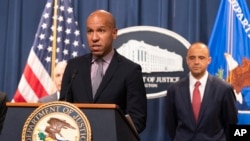In an emergency session of the Terrorist Financing Targeting Center (TFTC) this week, the U.S. called on allies in the Middle East to increase efforts to cut off outside funding for Hamas, the organization that perpetrated a massive attack on Israeli civilians on October 7.
The Treasury Department called on the member countries of the TFTC to use their influence to do more to cut off the flow of funds to Hamas, which controls the Gaza Strip, home to some 2.3 million Palestinians who have been under relentless Israeli shelling for more than two weeks.
The U.S. has classified Hamas as a terrorist organization since 1997.
“From our perspective, not acting against Hamas and its terrorism is a disservice to the Palestinian people,” Treasury Under Secretary for Terrorism and Financial Intelligence Brian Nelson said in a prepared statement released Tuesday to the group.
“From a financial standpoint, we can clearly see that Hamas has exacerbated economic hardships for decades in the Gaza Strip by diverting humanitarian assistance to support its campaign of terror, and we must publicly condemn these actions.”
The TFTC is made up of Bahrain, Kuwait, Oman, Qatar, Saudi Arabia, United Arab Emirates and the United States.
Meeting schedule accelerated
In his remarks, Nelson said, “We cannot tolerate a world in which Hamas and other terrorist organizations’ fundraisers live and operate with impunity, abusing the financial system, to sustain their terror. The United States will not tolerate that world.”
Founded in 2017, the TFTC is based in Riyadh, and brings together government officials from its member countries to discuss ways in which they can collaborate to reduce the flow of funds to terrorist organizations and to combat money laundering in general.
The meeting this week, originally scheduled for November, was brought forward as a result of the crisis in Israel and Gaza.
Just a week ago, the U.S. Treasury Department announced new sanctions on Hamas, including on a “secret investment portfolio” that it claimed brought in large sums of money for the group.
New priorities
Jessica Davis, a visiting senior fellow at the Soufan Center and an expert on countering terrorism finance, told VOA that international efforts to crack down on Hamas’ funding sources have waned in recent years as the perception grew that it was less of a terrorist threat than it had been in the past.
“That was obviously wrong,” Davis said. “The events of October 7 demonstrate that Hamas continues to be a problem. And that's probably going to shift some countries’ prioritization and reinvigorate efforts to counter their financing.”
The U.S. will be asking members of the TFTC, as well as other countries in the region, to accelerate that shift. One request will be that countries take concerted action to prevent Hamas from simply moving fundraising operations from one country to another when sanctions begin to bite.
“There's definitely plenty of avenues of Hamas financing that can be shut down, and it's not just in the Middle East,” she said. “Historically, Hamas has operated broad networks, drawing support from charities and identity-based support networks.”
“A lot of these networks exist around the world,” Davis said. “Some of them are smaller, some of them are bigger. A lot of them are in the Middle East, but a lot of them are outside of the Middle East. And [those networks are] really the place where the international community can have some impact at this point in time.”
Shutting down those networks, she said, could have a meaningful impact on Hamas and its capacity to continue operations.
Aid to Gaza questioned
On Wednesday, the Republican-led House Oversight Committee issued a letter to the Biden administration calling on the U.S. Agency for International Development (USAID) to provide assurances that humanitarian aid delivered to the people of the Gaza Strip does not fall into the hands of Hamas, or other organizations considered terrorist groups by the U.S. government.
The letter, addressed to USAID Administrator Samantha Power, was signed by 24 Republican members of the committee, including Chairman James Comer.
“The scale and complexity of the barbaric Hamas atrocities that commenced on October 7th in Israel make it clear that significant financial resources were used for these attacks,” the letter noted. It pointed out that under the Trump administration, aid to Gaza had been sharply reduced because of the difficulty in ascertaining that it was not being used to benefit Hamas, a position that was subsequently reversed by the Biden administration.
In outlining the committee’s request for information from USAID, the letter stressed that the Hamas attacks had directly harmed U.S. citizens as well as Israelis.
“The most recent atrocities committed by Hamas have resulted in significant and rising numbers of deaths and injuries, including dozens of American casualties and hostages,” it said. “This episode underscores the critical importance of ensuring aid funds do not inadvertently increase financial support for terrorist activity.
“If U.S. taxpayer dollars are financing terrorist activity, the Biden Administration must cease such aid in order to protect Americans and our allies.”




